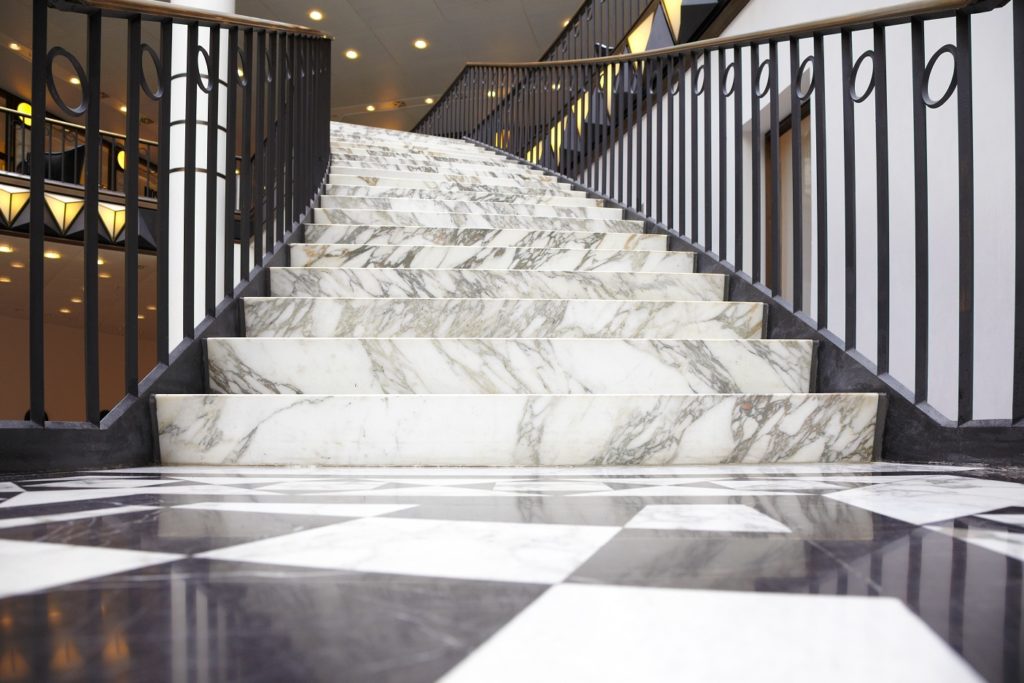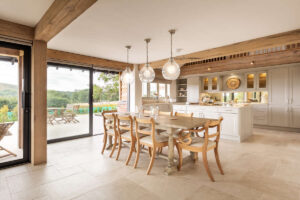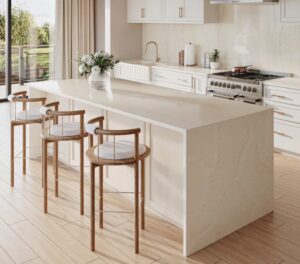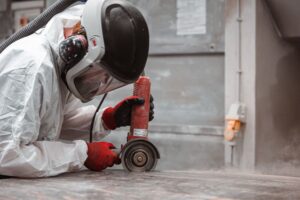Table of Contents
- Are Marble Features Easy To Maintain?
- 1. Cleaning
- 2. Sealing
- 3. Avoid acidic substances
- 4. Preventive measures
- 5. Polishing
- 6. Regular maintenance
- I’ve Heard Marble is Delicate – is That True?
- What Kind of Cleaners Should I Use?
- What Can Damage Marble?
- How Do I Repair Damaged Marble?
- Are Marble Features Easy to Maintain? Conclusion
Are Marble Worktops/Features Easy to Maintain?
Maintaining the impeccable condition of your marble kitchen worktops, floors, staircases, and other features requires surprisingly minimal effort. Marble possesses remarkable durability, effortlessly withstanding heavy use while retaining its exquisite appearance. Just consider the enduring allure of the marble floors in iconic structures like the 93-year-old Empire State Building or the 301-year-old Blenheim Palace, where thousands of visitors traverse them daily. With proper care, your marble features can remain stunning for years, if not decades.
Are Marble Features Easy To Maintain?
Marble features, such as marble worktops, floors, or other surfaces, require some level of maintenance to keep them looking their best. While marble is a durable and long-lasting material, it is a porous stone and can be susceptible to staining and etching if not properly cared for.
These are some easy steps to help maintain your marble features:
1. Cleaning
Regularly cleaning marble is necessary to remove dirt, dust, and spills from the marble surface. Use pH-neutral cleaners specifically formulated for marble to avoid damaging the stone. Avoid using abrasive cleaners that can scratch or etch the surface. Promptly clean up any spills to prevent staining with a soft cloth.
2. Sealing
Marble should be sealed to create a protective barrier that helps prevent liquids from seeping into the stone. Sealing helps reduce the risk of staining and makes cleaning easier. The frequency of sealing depends on factors such as the type of marble, usage, and the sealant used. It’s generally recommended to reseal marble every 6 to 12 months or as advised by the manufacturer.
3. Avoid acidic substances
Acidic substances like citrus juices, vinegar, or certain cleaning products can etch and damage the marble surface. Be cautious when using or storing such substances near marble features. Use coasters or mats under acidic beverages and wipe up any spills immediately.
4. Preventive measures
Use mats or rugs in high-traffic areas or areas prone to spills to minimize the risk of scratches and stains. Avoid dragging heavy objects directly on the marble surface, as it can cause scratches. Use cutting boards and trivets to protect the marble from scratches and heat damage.
5. Polishing
Over time, marble can lose its shine due to wear and tear or surface damage. Periodic polishing can help restore its lustre. However, excessive or aggressive polishing can remove the protective layer of the marble and damage it. It’s best to follow proper polishing techniques or seek professional assistance for polishing.
6. Regular maintenance
Regularly inspect your marble features for any signs of damage, staining, or deterioration. Address any issues promptly to prevent them from worsening.
I’ve Heard Marble is Delicate – is That True?
Yes and no. Marble is a delicate stone but it’s still a stone. This means that, unlike wood, vinyl or laminate, marble kitchen worktops can withstand heat, water, and steam and take more knocks and bumps than non-stone materials. Modern marble kitchen worktops, tiles and floors are typically sealed to protect them from staining. So while we don’t recommend dropping a bottle of red wine on your worktop (what a waste!) it’ll probably be fine if you do.
What Kind of Cleaners Should I Use?
Use only gentle cleaners. Marble is formed of calcium carbonate which reacts with acids, including food acids such as vinegar or lemon juice. The sealant will protect the marble from everyday spills and use, but it’s best to avoid acid-based cleaners, even homemade ones, particularly if you’re applying a paste and leaving it to soak in. Strong cleaners such as bleach can also damage marble, so the rule of thumb is to use simple, gentle cleaners – these tend to be better for you and the planet as well – or a specialised stone cleaner if the dirt buildup is really extensive.
What Can Damage Marble?
Marble kitchen worktops and floors are typically finished with a high-gloss polish, and this mirror finish can be damaged more easily than the stone beneath. Just as a scratch on a mirror or smartphone screen is much more obvious than on a rough surface like a patio slab, a scratch or dull patch on your mirror finish marble worktop will be disproportionately obvious. For this reason, it’s best to avoid things that could scratch the surface, such as furniture with metal feet, or chopping directly on a marble kitchen worktop (this will also ruin your knife). Avoid cleaning with abrasive tools such as scourers and steel wool. Harsh cleaning products, acids or bases (such as vinegar or bleach) should also be avoided. Dropping heavy objects can also crack, chip or break marble, but normal use should not.
How Do I Repair Damaged Marble?
Depending on the extent of the damage, you may need a specialist repair service or to replace part of your floor or marble countertop. At Surrey Marble and Granite, we offer a wide range of marbles, so we may be able to assist with repair work or stone matching. Contact us for an individual assessment and quote.
Are Marble Features Easy to Maintain? Conclusion
Yes indeed! In most cases, when cleaning and caring for your marble features, all you need to do is wipe your marble kitchen worktop down with a sponge and water. You can use a light cleaner such as washing up liquid on more stubborn spots. Once sealed, marble is smooth and non-porous which means that there’s nowhere for germs, dirt and bits of food to hide – they’ll all be wiped away.
While marble features require some maintenance, proper care can keep them looking beautiful for years. It’s important to understand the specific care recommendations for your particular type of marble, as different types may have varying levels of porosity and susceptibility to damage. Consulting with professionals or referring to manufacturer guidelines can provide valuable insights on maintaining your specific marble features.





